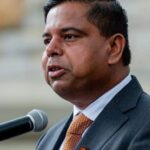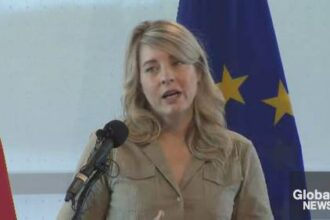The stars dimmed across Canada today as the nation mourns the loss of one of its most distinguished citizens. Marc Garneau, Canada’s pioneering astronaut who later transitioned to a celebrated political career, has died at 76, leaving behind an extraordinary legacy that spans the cosmos and corridors of Parliament.
Garneau, who made history in 1984 as the first Canadian to journey into space aboard the Challenger space shuttle, passed away peacefully surrounded by family, according to a statement released by the Prime Minister’s Office early Wednesday morning.
“Marc didn’t just reach for the stars—he actually touched them,” Prime Minister Chrystia Freeland said in an emotional address. “His contributions to our nation’s scientific advancement, educational initiatives, and public service have left an indelible mark on Canada’s identity that will endure for generations.”
Born in Quebec City in 1949, Garneau’s trajectory from naval officer to astronaut and eventually federal cabinet minister exemplifies a life of remarkable achievement and service. After earning engineering degrees from the Royal Military College of Canada, Garneau was selected from over 4,000 applicants to join Canada’s first astronaut program in 1983.
His historic first spaceflight in 1984 captivated the nation, but it was merely the beginning. Garneau would go on to complete two additional missions, logging over 677 hours in space before being appointed president of the Canadian Space Agency in 2001.
“Marc never viewed space as the final frontier—he saw it as the first step in pushing human knowledge forward,” said former NASA colleague Julie Payette. “His scientific mind was matched only by his profound humility and desire to inspire young Canadians.”
In 2008, Garneau pivoted to politics, winning election as a Liberal MP for the Montreal riding of Westmount–Ville-Marie. His political career culminated in his appointment as Transport Minister in 2015, where he oversaw significant policy reforms in aviation safety, railway regulations, and maritime security.
“His approach to governance was exactly what you’d expect from an engineer and astronaut,” noted former parliamentary colleague Ralph Goodale. “Methodical, evidence-based, and always focused on practical solutions rather than partisan advantage.”
Throughout his tenure in Canadian politics, Garneau championed science-based policy making and educational initiatives, particularly those aimed at engaging young Canadians in STEM fields. His Garneau Foundation, established in 2005, has provided scholarships to hundreds of students pursuing careers in engineering, mathematics, and space sciences.
The response to Garneau’s passing has transcended political boundaries, with tributes pouring in from across party lines and international space agencies. NASA posted on social media: “Marc Garneau embodied the collaborative spirit of space exploration. His contributions strengthened not just Canada’s place in space, but humanity’s reach for the stars.”
Flags across federal buildings will fly at half-mast until Garneau’s state funeral, scheduled for next Monday in Ottawa. The Canadian Space Agency has announced plans to name its newest research facility in his honor, ensuring his pioneering spirit continues to inspire future generations of scientists and explorers.
Beyond his professional achievements, colleagues remember Garneau for his wry humor, dedication to mentorship, and unwavering commitment to evidence-based decision making in both scientific and political realms.
“What made Marc truly extraordinary wasn’t just that he flew in space or served in cabinet,” reflected former Prime Minister Justin Trudeau. “It was his fundamental belief that public service—whether scientific or political—should always be directed toward making life better for ordinary Canadians.”
As we reflect on Marc Garneau’s remarkable journey from the depths of space to the heart of our democracy, perhaps we should consider: What greater tribute could we pay to his legacy than recommitting ourselves to the evidence-based policy making and scientific excellence that defined his extraordinary career?

























